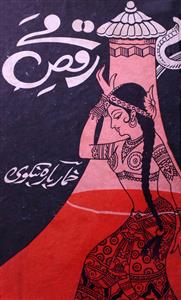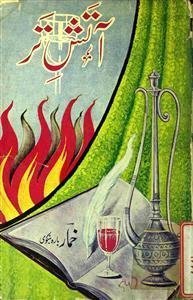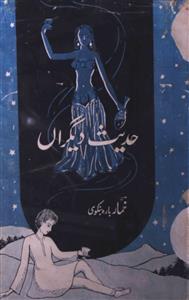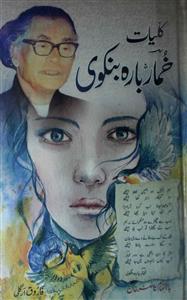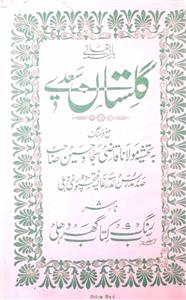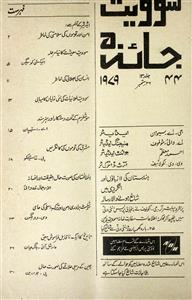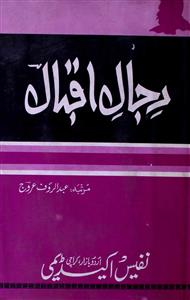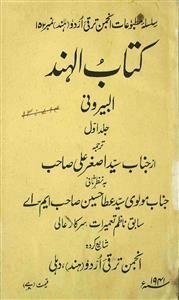 For any query/comment related to this ebook, please contact us at haidar.ali@rekhta.org
For any query/comment related to this ebook, please contact us at haidar.ali@rekhta.org
About The Book
باکمال ،صاحب طرز غزل گو شاعر خمار بارہ بنکوی کے غزلیہ شاعری کا مجموعہ "رقص مے"پیش نظر ہے۔خمار کے یہاں جو سادگی اور پرکاری ملتی ہے وہ ان کے ہم عصروں میں بہت کم نظرآتی ہے۔ان کے انداز بیان میں انفرادیت ہے۔ان کی شاعری حسن و عشق سے متعلق دل کی شاعری ہے۔جس کے متعلق وہ خود کہتے ہیں۔" میری شاعری حسن و عشق سے متعلق ہے جب کبھی دل کسی خاص حادثہ یا کسی خاص جذبہ سے متاثر ہوتا ہے ،شعر ہوجاتا ہے،جذبات حسن و عشق کا تجزیہ ہی میری شاعری ہے۔"ان کے مکمل کلام میں یہی جذبہ غالب ہے۔ان کی غزلیں واردات عشق کی خوبصورت ترجمانی کے ساتھ ،حالات حاضرہ کی تلخیوں کی عکاس ہیں۔انھوں نے زندگی کی تلخ حقیقتوں اور اس کے فطری جبر سے متصادم ہونے والی انسانی کیفیات و جذبات او رسماجی خلا سے ابھرنے والی یاسیت اور لاحاصلیت کے احساس کو اپنی شعری نفسیات میں تحلیل کر کے غزل کے فطری رنگ کو دوآتشہ کردیا ہے۔اس لیے ان کی غزلوں میں یاسییت اور محرومیت کا عنصر بھی موجود ہے۔
About The Author
The legacy of Urdu ghazal has been shared among millions of poets for centuries, but there are very few poets who have lost their jewels and whose tongues have become pearls of words. Wali Deccani had lit the lamp of Urdu ghazal which first shone in Delhi and then rained down in the houses of Lucknow. Lamp after lamp and candle after candle. In connection with these familiar soft and charming light candles, there was probably one last candle lit in the chandelier of Tarannum, which Muhammad Haider Khan ‘Khumar’ became a keeper of and kept burning till March 1999. There was no peer of ghazal singing and ghazal is a genre of poetry immersed in passion. He used to say that Ghazal was alone in its path. The city of Barabanki is located 23 km east of the capital of Uttar Pradesh. Its special dialect is somewhat similar to Odhi but the educated class and the nobles speak the language of Lucknow. Civilization is the same. Poetry festivals and poetry readings and other literary activities are held. There is also the town of Rudoli in Barabanki district where famous poets were authorized. Qurb Barabankvi was also a good poet whose poems were also liked by the people of Lucknow. One of his students was Muhammad Haider Khan, a 12-year-old “Khumar Barabankvi’. He was educated in school and college and worked in the police department and poetry was his passion since childhood. At first he continued to participate in local poetry readings, then he recited in private societies in Lucknow, then became open and was invited to regular poetry readings. Nature had given him a very charming and passionate voice in accordance with the ghazal, which should be called an invigorating sound. He picked up this art of recitation from another great poet Jigar Muradabadi. Khumar writes in one place that "after analyzing all the genres of speech, I found the classical ghazal to be the most suitable and appropriate for expressing my feelings and events, so I joined the service of ghazal."
In 1945, Khumar came to Bombay with, Jigar Muradabadi and Majrooh Sultanpuri to participate in a Mushaira. When AR Kardar heard his poems, he asked him to write a song in his film "Shah Jahan" which Khumar accepted. Nowshad composed the music and Kundan Lal Sehgal sang the song. Khumar was very simple and had interesting conversations. He used to bow down to everyone. Initially he was addicted to alcohol but later repented. On March 19, 1999, Khumar Barabankvi left his mortal coil when he was 80 years old. His three collections of poems, "Atish-e-tar", "Raqs-e-Mai", "Shab-e-Tab" have been published in print.
 For any query/comment related to this ebook, please contact us at haidar.ali@rekhta.org
For any query/comment related to this ebook, please contact us at haidar.ali@rekhta.org
